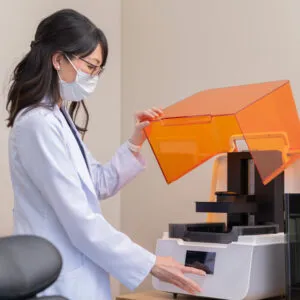Pain in your mouth is a job for the dentist, right? While this might be everyone’s first instinct, it’s not necessarily true. Orofacial and dental pain may feel similar at times, but they are two different conditions—and require two vastly different specialists to treat.
12 different specialties fall under the dental practitioner umbrella, and orofacial pain specialists are the most recent additions to that list as of March of 2020. To understand the difference between an orofacial pain specialist vs a dentist, let’s take a look at what each treat and the main differences between their training and practice.
What Does a Dentist Do?
A general dentist’s main area of practice is the diagnosis and removal of diseased dentition (AKA, teeth, and the accompanying structures). While simply stated, these encapsulate a huge amount of information and possible treatments, and their services are invaluable in providing pain relief and general wellbeing to the majority of the population.
Dental pain can come from different sources, many of which are usually pretty straightforward: infection and decay allow room for irritating bacteria to cause pressure on the nerves and structures around the teeth. When this happens, dentists can treat dental pain by removing the diseased tissue, which should stop the pain at its source. Some examples of this are filling cavities or performing root canals on diseased teeth.
What Does an Orofacial Pain Specialist Do?
Orofacial pain specialists are dentists who have undergone training to diagnose and treat orofacial pain, which is more complicated and less understood. The American Academy of Orofacial Pain (AAOP) defines orofacial pain specialists as “the specialty of dentistry that encompasses the diagnosis, management, and treatment of pain disorders of the jaw, mouth, face, and associated regions.” This can encompass lasting or chronic pain around the face and neck which can even present similarly to dental pain, and in fact, has often been conflated or misdiagnosed as dental pain in the past. Only recently has the field of orofacial pain specialty started to be fully recognized and explored—to the benefit of frustrated patients who have dealt with orofacial pain.
The Big Differences
Training
General dentistry is a doctorate-level recognition and requires four years of training and clinical study at an accredited dental school. After graduation, a dentist receives their Doctorate of Dental Surgery degree and can go into practice. In addition to all of these certifications, achieving an Orofacial Pain Specialty requires the completion of a two or three-year advanced training program specifically pertaining to diagnosing and treating orofacial pain.
Duties
An Orofacial Pain Specialist works from the same knowledge set that a dentist does, but patients are often referred to an OPS by another dentist. Usually, these patients are experiencing pain that their dentist has concluded is not caused by any dental issues. An OPS will then explore alternative causes of pain, including bruxism (grinding of teeth), Temporomandibular Joint Disorders, or muscular tensing due to psychosocial stressors, among others. It’s this focus on biosocial causes of pain that is perhaps the greatest difference between a general dentist and OPS, as a pain specialist is trained to recognize these subtle causes of pain and treat them accordingly.
Pharmacology
An OPS may also have a greater knowledge of pharmacology to treat persistent or chronic pain. Medication may be prescribed in addition to lifestyle changes or physical treatment for orofacial pain, in which case an OPS must also have extensive knowledge of appropriate pharmacological treatment options and prescription protocols.
When to See an Orofacial Pain Specialist and When to See a Dentist
Most patients seek help from an orofacial pain specialist after consulting with their general dentist or orthodontist. Because the causes of orofacial pain are still not very well understood, many patients and physicians will eliminate other, more common, causes of pain before referring to a specialist. Suppose you are experiencing pain in the face, neck, or jaw, or perhaps are suffering from severe or persistent headaches. In that case, an orofacial pain specialist may be able to provide relief. Similarly, if you are experiencing pain in the mouth or near your teeth that is resistant to treatment from your dentist, you may be experiencing orofacial pain that is separate from dental pain, and should seek the help of an OPS.
If you live in northern Nevada and believe you need the help of a specialist, the Northern Nevada Center for Orofacial pain is the only orofacial pain clinic in the area—and is now accepting new patients! Our certified specialists offer the only form of orofacial and TMJ treatment in Reno, so call today to schedule an appointment and let us help you treat your pain.

